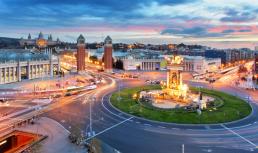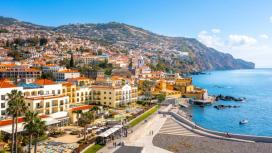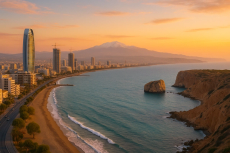Blog • Published on:February 13, 2025 | Updated on:February 17, 2025 • 33 Min
Portugal Golden Visa: Guide to Residency & Citizenship 2025
If you’re a non-EU citizen planning to move to Europe, you’ve probably considered the Portugal Golden Visa Program. And if not, this is definitely worth thinking about. The program has become one of Europe’s most popular residence-by-investment options.
Whether you’re seeking a European base, long-term security, or simply the freedom to live in Portugal, the Golden Visa is a top choice for investors worldwide.
In recent years, there have been updates and reforms designed to simplify the application process and enhance the program’s appeal, ensuring it remains competitive and beneficial for both Portugal and investors alike.
Let’s take a closer look at the Golden Visa program, its investment options, benefits, the latest reforms, and how it can help you achieve your goals in one of Europe’s most desirable destinations.
Program Details and Overview
The Golden Visa isn’t technically a visa, but a residency-by-investment program that allows non-EU and non-EEA nationals to obtain a Portuguese residence permit in exchange for a qualifying investment. The program grants the right to live, work, and study in Portugal, along with the added benefit of visa-free travel across the Schengen Zone.
After five years of legal residency, investors may apply for Portuguese citizenship, provided they meet all requirements. This makes the Portugal Golden Visa one of the fastest routes to EU citizenship compared to other investment programs across Europe.
What is the Portugal Golden Visa Program
Launched in October 2012, the Portugal Golden Visa Program is a legal process based on the law that invites foreign investors from non-European Union countries to obtain fully valid residence permits in Portugal for themselves and their families.
In exchange for permanent residency, applicants to the program are required to pass all due diligence checks and invest in real estate in the country. Once applicants receive their residence permit, they will gain the right to live, work, travel and study in Europe, as well as have access to Portugal’s healthcare and consumer rights.
Program History and Evolution
Portugal’s approach to foreign investment has changed significantly over the years. While the country was once more closed off to outside investors, the economic downturn of the early 2000s prompted a shift in policy.
In 2012, as part of a broader effort to stabilize the economy and attract international capital, Portugal introduced the Golden Visa program, the first of its kind in Europe.
The initiative was designed to encourage foreign investment, particularly in real estate, which was struggling at the time. By offering residency in exchange for investment, the program aimed to reinvigorate the property market, generate economic activity, and create jobs.
Since its inception, the program has surpassed expectations, bringing in more than $7 billion in foreign capital and granting residency to over 15,000 investors. Initially, real estate was the overwhelming choice, with over 90% of applicants securing residency through property acquisitions.
However, as Portugal’s housing policies evolved and urban markets became saturated, the government took steps to shift investment into other sectors that could contribute more sustainably to the economy.
Recognizing the need for long-term economic growth, the government eliminated real estate as an eligible investment option in 2023. The updated Golden Visa program now focuses on business creation, venture capital funds, scientific research, cultural preservation, and job generation.
These reforms are intended to diversify foreign investments, foster innovation, and support Portugal’s broader economic development goals.
Golden Visa Portugal: Investment Options Overview
Portugal offers multiple pathways for investors seeking residency through the Golden Visa program. Below is a breakdown of the key investment options and their requirements.
- Venture Capital Fund Investment – A minimum investment of €500,000 in an approved venture capital or private equity fund. Funds linked to real estate investments are excluded.
- Cultural Heritage or Arts Donation– A €250,000 contribution to support arts, heritage, or cultural preservation initiatives in Portugal.
- Scientific Research– An investment of at least €500,000 in research projects focused on science or technology within public or private institutions.
- Job Creation- Creation of at least 10 full-time jobs in Portugal (with possible lower thresholds for some low-density regions or specific business types).
- Cultural Investment – A contribution of €250,000 (or €200,000 in designated low-density areas) towards cultural projects supporting Portugal’s artistic and historical heritage.
- Company Investment & Job Creation – Invest €500,000 in an existing Portuguese business with a commitment to create five permanent jobs or maintain ten existing jobs, at least five of which must be permanent.
These options provide various ways to qualify for the Golden Visa, allowing investors to choose a pathway that aligns with their financial and business goals. Each option has specific requirements, which we’ll explore in greater detail.
The Next Phase: Modernization and Efficiency
As the Golden Visa gained global popularity, application volumes surged, leading to longer processing times and administrative bottlenecks. To address these challenges, Portugal modernized its immigration framework, implementing digital tools, stricter compliance measures, and a more efficient application system.
A significant part of this transformation was the establishment of the Agency for Integration, Migration, and Asylum (AIMA), a dedicated government body responsible for managing immigration services.
With AIMA taking charge, processing capacity has increased, allowing the government to handle a larger number of applications with greater efficiency.
The shift to fully digital submissions, combined with automated scheduling for biometric appointments, has made the application process more streamlined and transparent.
Additionally, the government has committed to reducing backlogs and ensuring that future applicants experience faster and smoother processing.
With these updates, the Portugal Golden Visa continues to evolve, not just as a residency-by-investment program but as a strategic initiative to attract forward-thinking investors who can contribute to Portugal’s economic and cultural landscape.
Recent Changes to Portugal’s Golden Visa Program
There has been widespread speculation about whether Portugal’s Golden Visa has been suspended. The reality is that while the program remains active, it has undergone major revisions, particularly regarding investment options and tax benefits.
In October 2023, Portugal’s parliament approved a budget proposal that introduced significant reforms to the Golden Visa program. One of the most impactful changes was the elimination of real estate investment as a qualifying pathway to residency.
This decision was part of a broader effort to address housing market concerns and rising property prices.
With real estate removed from the equation, new qualifying investments now focus on venture capital funds, scientific research, cultural initiatives, and business creation.
The government’s aim is to redirect foreign investment into sectors that contribute to long-term economic growth rather than speculative real estate acquisitions.
Updated Citizenship Timeline
One of the biggest advantages of the revised program is that the Golden Visa application period now counts toward the five-year residency requirement for citizenship.
Previously, this countdown only began after residency approval, often delaying the citizenship process by a year or more due to lengthy processing times.
Now, the five-year period starts the day an investor submits their application, effectively reducing the wait time for Portuguese citizenship. Given that approvals can take between 6 and 18 months, this adjustment allows applicants to reach citizenship eligibility much sooner than under the previous rules.
End of the Non-Habitual Resident (NHR) Tax Regime
Another major reform impacting investors is the termination of the Non-Habitual Resident (NHR) tax regime for new applicants. Previously, the NHR provided significant tax benefits, including a flat 10% tax rate on foreign pensions and a reduced 20% tax rate on qualifying professions.
However, under the new budget rules, individuals who become new tax residents of Portugal will no longer be eligible to register under the NHR system.
To replace it, the government introduced a new tax incentive structure, often referred to as NHR 2.0. This updated framework shifts the focus to tax relief for active income earners working in scientific, technological, research, and academic fields.
It primarily benefits entrepreneurs, R&D professionals, and startup founders, but it no longer offers the broad tax advantages that made the original NHR attractive to retirees and remote workers.
A Shift in Investment Priorities
With real estate off the table, the Golden Visa is now centered around alternative investment options that align with Portugal’s economic development goals. Investors still have access to several qualifying routes, including:
- A €500,000 investment in a venture capital or private equity fund. This must be directed toward non-real estate sectors such as tech, healthcare, and sustainable industries.
- A €500,000 contribution to scientific or technological research. This investment must support national innovation and R&D initiatives.
- A €250,000–€200,000 investment in cultural or artistic projects, with lower thresholds for low-density areas.
- Establishing a business that creates at least ten full-time jobs for Portuguese residents.
- Investing €500,000 in an existing company, with a requirement to create at least five new permanent jobs or maintain ten existing ones.
These investment options reflect Portugal’s push toward sustainable economic growth and encourage foreign investors to contribute to industries beyond real estate speculation.
Portugal’s Immigration Reforms for 2025
With growing demand for the Golden Visa, Portugal has introduced digitalization and efficiency reforms to manage the surge in applications.
The Agency for Integration, Migration, and Asylum (AIMA) has taken over the processing of immigration applications, consolidating responsibilities previously handled by multiple government departments.
This agency aims to increase efficiency, with an estimated processing capacity of up to 6,000 applications per day.
In an effort to streamline the system, biometric appointments will be automatically scheduled starting January 15, 2025.
Additionally, all documents must now be submitted digitally via the ARI portal, eliminating paper-based applications and reducing delays caused by manual reviews.
The government has also adjusted processing fees, requiring €6,045.20 for certified document submissions and €8,060.20 for uncertified document submissions, payable at the biometric appointment stage.
Tightened Compliance & Risk of Abandonment
Investors should take note that applications that remain inactive for six months may be classified as "abandoned". This means that any delay in submitting required documentation or completing payments could jeopardize an application, requiring the investor to restart the process under updated regulations.
To address delays caused by the backlog of 400,000+ pending applications, the government has set a June 30, 2025, deadline to clear outstanding cases. If successful, this will significantly improve processing times for new applicants moving forward.
What These Changes Mean for Investors
As the real estate investment option is officially eliminated from the program, the program is now best suited for investors willing to explore venture capital, business development, or research funding opportunities.
For those who previously considered Portugal due to its tax benefits, the removal of the NHR program may be a deterrent. However, Portugal remains an attractive destination for entrepreneurs, investors, and professionals in innovative fields.
With the new digital application system and reduced citizenship timeline, the program continues to be one of the most accessible residency-by-investment options in Europe
Portugal Golden Visa: Investment Options Overview
Portugal offers multiple pathways for investors seeking residency through the Golden Visa program. Below is a breakdown of the key investment options and their requirements.
- Venture Capital Fund Investment – A minimum investment of €500,000 in an approved venture capital or private equity fund. Funds linked to real estate investments are excluded.
- Cultural Heritage or Arts Donation – A €250,000 contribution to support arts, heritage, or cultural preservation initiatives in Portugal.
- Scientific Research – An investment of at least €500,000 in research projects focused on science or technology within public or private institutions.
- Job Creation- Creation of at least 10 full-time jobs in Portugal (with possible lower thresholds for some low-density regions or specific business types).
- Cultural Investment – A contribution of €250,000 (or €200,000 in designated low-density areas) towards cultural projects supporting Portugal’s artistic and historical heritage.
- Company Investment & Job Creation – Invest €500,000 in an existing Portuguese business with a commitment to create five permanent jobs or maintain ten existing jobs, at least five of which must be permanent.
These options provide various ways to qualify for the Golden Visa, allowing investors to choose a pathway that aligns with their financial and business goals. Each option has specific requirements, which we’ll explore in greater detail.
Deeper Look on Golden Visa Investment Options
Portugal made the program accessible to many people, by offering variety of potential investment avenues. One can choose from the following options:
Investment Fund Options
- Minimum Investment: Typically, EUR 500,000, though a 20% reduction might apply if the fund focuses on specific low-density regions.
- Structure and Scope: These funds are often regulated by Portuguese authorities and may invest in startups, small to medium enterprises (SMEs), technology ventures, or a carefully regulated selection of real estate, though direct real estate ownership by the fund is also subject to evolving limitations.
Who It Appeals To:
- Passive Investors: People who don’t want the day-to-day responsibility of property management or running a business.
- Portfolio Diversifiers: Investors seeking exposure to multiple sectors of the Portuguese economy.
- Transparent Framework: Most qualified funds must meet regulatory standards, increasing transparency and potentially reducing risks for foreign investors.
Funds often have defined lifespans (5–10 years) and professional management teams. Subscription typically involves legal fees, management fees, and an exit plan, which may occur at the end of the fund’s term or according to specific buyback clauses.
Capital Transfer Alternatives
A capital transfer entails placing funds into approved channels within Portugal, such as:
- Scientific Research: A minimum of EUR 500,000 directed to R&D projects at recognized institutions.
- Artistic & Cultural Heritage: A minimum of EUR 250,000 directed to artistic production or preserving national cultural treasures.
- Direct Bank Deposit: A set amount (often EUR 1 million in the past; this figure has undergone adjustments over time) deposited in a Portuguese financial institution.
Why Choose This Route:
- Less administrative complexity compared to managing a business
- Directly contributes to important sectors like innovation or heritage conservation
- Typically requires fewer ongoing commitments post-investment
Capital transfer options suit investors keen on supporting national development priorities without actively operating a venture or dealing with the intricacies of a private fund.
After the funds are placed, you must maintain the investment to keep your residency active until you reach the thresholds for renewal or citizenship.
Business Creation Requirements
- Job Creation: One common method is to create at least 10 full-time jobs in Portugal (with possible lower thresholds for certain low-density areas or specific business types).
- Company Incorporation: Another option involves investing at least EUR 500,000 into a Portuguese business, increasing or creating a set number of jobs that must be maintained for the duration of your residency.
Key Benefits:
- Entrepreneurial Impact: You contribute directly to Portugal’s economy.
- Long-Term Profit Potential: If your business succeeds, returns can be far higher than purely passive investments.
- Community Integration: Operating locally can deepen your ties in Portugal, from forging professional networks to building a more permanent life.
This path demands the highest involvement, as you’ll be responsible for business strategy, compliance with Portuguese labor laws, taxes, and ensuring ongoing success.
However, it can be incredibly rewarding, especially for those with a strong entrepreneurial drive and a robust business concept tailored to the Portuguese or broader EU market.
Key Requirements for Portugal Golden Visa
Regardless of which investment route you pursue, you must fulfill specific universal criteria to qualify.
Financial Requirements
- Legitimate Funding Source: You must confirm that your investment capital was obtained through legal means, demonstrating its origin via bank statements, property sale records, corporate dividends, or other documentation.
- Minimum Thresholds: Each investment path comes with a statutory minimum (ranging between EUR 250,000 and EUR 500,000 or more, depending on whether you opt for research funding, cultural donations, business creation, or fund investments).
- Maintenance of Investment: You must keep the entire investment in place while you hold your Golden Visa. Selling the fund shares, withdrawing capital, or shutting down a business prematurely could lead to residency revocation unless you reinvest in another qualifying route.
Documentation Needed
While exact paperwork can vary, typical requirements include:
- Identification: Valid passport and additional ID as required.
- Proof of Investment: Depending on your chosen avenue, this can be fund subscription certificates, bank deposit confirmations, or corporate registration documents.
- Criminal Record Check: You must submit police clearance certificates from all relevant jurisdictions where you have lived for a specified period (often one year or more).
- Health Coverage: Though not always mandatory, many applicants opt to show evidence of valid health insurance, ensuring they do not burden public healthcare services.
- Family Documentation (if applicable): Marriage certificates, birth certificates for children, and evidence of dependency (e.g., for older children or parents).
Often, these documents need to be translated into Portuguese by a certified translator and bear an apostille or consular authentication, depending on your country of origin.
Physical Stay Requirements
- 7 Days in the First Year: Once you’re granted your initial 1-year residence permit, you must spend at least 7 days in Portugal during that period.
- 14 Days in Subsequent Two-Year Renewals: Each renewal covers a 2-year span, during which you need a total of 14 days physically in Portugal.
- Rationale: These rules promote genuine ties to Portugal. They are relatively lenient compared to some global residency programs, making the Golden Visa popular among business travelers and global citizens with multiple bases.
Clean Criminal Record
An applicant must not have any significant criminal convictions. Generally, convictions punishable by over a certain threshold (often more than one year) can render a person ineligible. Immigration authorities thoroughly check your background to safeguard public safety and maintain the program’s integrity.
Benefits of the Portugal Golden Visa
The Portugal Golden Visa offers a range of advantages beyond residency. From unrestricted travel within Europe to long-term security for investors and their families, the program provides flexibility, stability, and a direct path to citizenship.
1. Visa-Free Travel & EU Mobility
One of the most valuable benefits of holding a Portuguese residence permit is the freedom to travel across the Schengen Area without a visa. This includes 29 European countries, allowing Golden Visa holders to move easily for business, leisure, or family visits.
Portugal’s Tier A passport ranks among the most powerful globally, offering visa-free access to 175 countries as of 2024. While residency alone does not grant a passport, it enhances travel privileges for those who may face visa restrictions due to their current nationality.
2. Residency & Citizenship Pathway
Portugal offers one of the shortest timelines to citizenship in Europe, requiring only five years of legal residency. The naturalization process is straightforward, and applicants are not required to live full-time in Portugal. Instead, they need to spend just seven days in the first year and 14 days every two years thereafter.
At the end of five years, residents can apply for Portuguese citizenship, provided they meet the basic A2-level language requirement and maintain a clean legal record. Citizenship unlocks full EU rights, including the ability to live, work, and study anywhere in the European Union.
3. Work and Business Opportunities
Golden Visa holders gain the legal right to live and work in Portugal, opening doors to employment, entrepreneurship, and investment across multiple industries. Since Portugal is part of the EU, residents also have an easier time securing visas for other countries.
Additionally, for those who wish to start a business, Portugal has a thriving entrepreneurial ecosystem, supported by government incentives, tax benefits, and a strong startup culture. The country’s strategic location makes it an ideal base for accessing both European and international markets.
4. Family Inclusion & Long-Term Security
The Golden Visa extends benefits to immediate family members, including spouses, dependent children, and, in many cases, dependent parents. This allows families to secure their future in Europe, ensuring access to high-quality education, healthcare, and lifestyle benefits.
The program also allows flexibility, while residency must be maintained, investors and their families are not required to live in Portugal full-time. This makes it a great option for those seeking a Plan B without disrupting their current lifestyle.
5. Government Stability & Policy Transparency
Portugal’s Golden Visa program remains one of the most stable residency-by-investment schemes in Europe. While adjustments have been made, the government has provided clear communication about program updates, ensuring that existing investors are not negatively impacted.
Political support for the program remains strong, and there are no indications of sudden policy reversals. Investors can confidently plan for long-term residency and eventual citizenship, knowing that Portugal continues to welcome foreign investment.
6. Tax Benefits & Crypto-Friendly Policies
For investors looking to optimize their tax situation, Portugal offers significant advantages. The Non-Habitual Resident (NHR) tax regime provides reduced tax rates on certain foreign income for up to ten years, making it an attractive option for expatriates.
Additionally, Portugal remains a crypto-friendly jurisdiction, meaning that cryptocurrency transactions are not subject to taxation under current laws. These financial incentives make Portugal a strategic location for investors seeking tax efficiency and asset protection.
Portugal Golden Visa Application Process
Though the Golden Visa application may appear complex at first glance, it’s generally systematic once you understand the steps. Digital reforms implemented in recent years, and especially heading into 2025, aim to simplify and speed up the experience.
Step-by-Step Application Guide
1. Choose an Investment Route: Reflect on your financial capacity, risk tolerance, and personal preferences. Funds, capital transfer, business creation, each has unique pros and cons.
2. Open a Portuguese Bank Account (If Required): Many investment categories require a local bank account. Often, the process can be conducted remotely, but it may be more efficient to visit Portugal or use specialized banking services.
3. Compile Documentation: Gather and translate (into Portuguese, if needed) proof of funds, identification, criminal record checks, marriage certificates, and so forth. Ensure all required seals, apostilles, or notarial verifications are in order.
4. Complete Investment: Make the necessary fund subscription, capital transfer, or business setup. Obtain official proof, like bank confirmation letters or notarial records, for submission to the immigration authorities.
5. Submit Online Application: Effective 2025, all submissions go through the official ARI portal operated by AIMA. You must upload certified electronic copies of each document, pay initial processing fees, and await confirmation.
6. Biometric Appointment: After pre-approval, you (and any family members) will be scheduled for a mandatory in-person biometrics session. Under the new reforms, appointments will be automatically assigned starting January 15, 2025.
Fees: The government has introduced updated fee structures, with €6,045.20 per application for “certified” documentation and €8,060.20 if documents are “uncertified.” Payment is often made by card at the appointment.
7. Wait for Approval: Following biometrics, authorities review your file and decide on final approval. Processing times vary but typically range between 6 and 9 months overall. Ongoing reforms aim to clear application backlogs.
8. Obtain Residence Permit: Once approved, you’ll receive your initial 1-year residence card. Remember to abide by the physical presence requirement, 7 days in the first year, and maintain the investment.
9. Renewal: At the end of the first year, renew for a 2-year period. Further renewals follow the same pattern until you reach 5 years, when you may apply for permanent residency or citizenship.
Processing Times
While official timelines can fluctuate, the average stands at 12-18 months. However, the government’s 2025 goal is to clear all pending cases by June 30, 2025, reducing wait times dramatically. Factors that can cause delays include:
- Document Errors or Missing Items: Ensuring your submission is complete from the start prevents rejections.
- No-Show Rate: There is approximately a 15% no-show statistic for biometrics appointments, causing scheduling inefficiencies.
- High Application Volumes: With a surge in interest, authorities sometimes struggle with staffing, although additional digital tools are meant to mitigate this.
Renewal Requirements
Renewals demand proof that:
- You’ve Maintained the Investment: Fund subscriptions, capital deposits, or business operations should be intact.
- Minimum Stay Requirements Are Met: At least 7 days for the first year, 14 days across each subsequent 2-year renewal block.
- You Retain a Clean Criminal Record: Any serious legal issue could jeopardize renewal.
Following 5 years of lawful residency, you can either continue renewing or apply for permanent residency or citizenship, assuming you meet the language and good-standing requirements.
Living in Portugal: How to Maxime Your Residency
Beyond the formalities and procedures, one of the most attractive elements of the Golden Visa is the potential to enjoy an extraordinary quality of life in Portugal.
Below is a deeper exploration of what day-to-day life might look like if you choose to spend a significant portion of your year in this welcoming nation.
1. Cultural Richness and Heritage
Portugal’s history spans centuries, from the Age of Discoveries that shaped global trade routes to the artistic influences of Moorish architecture:
- Festivals and Holidays: Nearly every town and city has its own annual celebration, featuring folk music, regional gastronomy, and religious traditions.
- Museums and Art: From world-class collections in Lisbon’s museums to local galleries celebrating contemporary Portuguese artists, there’s a robust cultural scene.
2. Culinary Delights
- Seafood Specialties: Fresh fish, grilled sardines, and shellfish dominate menus in coastal areas.
- Regional Dishes: Traditional stews, roasted meats, and delicious pastries like the famed pastel de nata highlight Portuguese culinary diversity.
- Wine Regions: The Douro Valley, Alentejo, and other wine-producing areas boast internationally recognized labels. Wine tours are a popular weekend pastime for residents and visitors alike.
3. Climate and Geography
- Varied Landscapes: Enjoy Atlantic beaches in the Algarve, rolling vineyards in the North, and scenic river valleys around every bend.
- Mild Winters, Warm Summers: Most of the country experiences temperate weather year-round, making outdoor activities accessible in all seasons.
4. Education and Healthcare
- Public Schools: Portuguese public schools generally follow standardized European curricula. Instruction is in Portuguese, though children often adapt quickly.
- International Schools: Lisbon, Porto, and the Algarve have established private institutions offering the International Baccalaureate (IB) or British/American curriculums.
- Public Healthcare: Residents have access to Portugal’s national health service, which is often praised for its cost-effectiveness and availability.
- Private Healthcare: Many expats opt for supplemental health insurance to access private facilities and skip some public system wait times.
5. Cost of Living
Compared to other Western European capitals, Lisbon remains relatively affordable, although prices have risen with its popularity.
Outside the major cities, housing and day-to-day expenses are typically lower. Groceries, dining out, and public transport are considered good value, attracting both retirees and younger professionals.
Read more on living costs in Portugal here.
6. Work and Business Environment
- Remote Work: With stable internet infrastructure and many co-working spaces, Portugal has become a haven for freelancers and digital nomads.
- Entrepreneurship: If you’re creating a business as part of your Golden Visa route, you’ll find support from incubators, innovation hubs, and government grants for technology, green energy, and tourism ventures.
- Growing Sectors: Renewable energy, technology startups, tourism, and agriculture are areas where Portugal has shown significant promise.
7. Community and Expat Networks
Portugal hosts a vibrant expatriate community, featuring:
- Social Clubs: Activities from sports clubs to book clubs, language exchanges, and philanthropic initiatives provide ample social opportunities.
- Language Classes: Numerous language schools cater specifically to newcomers, blending classroom instruction with cultural immersion trips.
8. Seamless European Access
Weekend jaunts to France, Italy, or Spain are routine for Portuguese residents. Low-cost carriers operate from airports in Lisbon, Porto, and Faro, connecting you to major European cities in just a couple of hours.
9. Safety and Stability
Portugal consistently ranks high in global peace and safety indexes. Petty crime occurs, primarily in busy tourist zones, but violent crime rates are generally low. Most residents report feeling safe walking around even after dark, which enhances quality of life and peace of mind.
10. Potential Challenges and Tips
- Learning Basic Portuguese: A2 level knowledge is eventually required for citizenship, and it also eases daily interactions like shopping, paying bills, or seeking local services.
- Bureaucracy: Navigating local bureaucracy can be challenging, especially in smaller municipalities. Patience and a sense of humor help; professional assistance can smooth the process if you have limited time.
- Cultural Adaptation: From mealtimes to personal space norms, small cultural differences might require a brief adjustment period.
Where to Live (and Where Not to) in Portugal
When it comes to choosing where to live in Portugal, you’re in for a treat – the country has a little bit of everything. Whether you’re after the hustle and bustle of city life or the tranquility of the countryside, you’ll be surrounded by natural beauty and a welcoming atmosphere wherever you go.
However, not all areas are ideal for settling down, and some may require more patience and adaptability than others.
Here are a few cities that stand out, along with a few that might not be the best fit for everyone:
- Lisbon: As the capital, Lisbon offers a rich blend of old-world charm and modern convenience, with a buzzing cultural scene and strong job prospects, especially in tech and finance.
- Porto: This second-largest city in Portugal is known for its charm, character, and rich history. Like Lisbon, expect the cost of living to be a bit higher, but it still tends to be more affordable than the capital. Porto is famous for its port wine, riverside cafés, and beautiful architecture.
- Albufeira (Algarve): If you’re after endless sunshine, Albufeira in the Algarve region might be your dream home. It’s ideal for those who want a quiet, sunny retreat with plenty of outdoor activities and a welcoming expat community.
- Silver Coast (Caldas da Rainha): An hour north of Lisbon lies the town of Caldas da Rainha, a town built around one of the oldest thermal hospitals in the world. The town offers a quieter, slower-paced lifestyle compared to Lisbon, making it perfect for those who want a mix of modern conveniences and natural beauty.
- Lagos (Algarve): Located in the southern Algarve region, Lagos enjoys some of the warmest weather in the country. Lagos is surrounded by dramatic coastlines, rock formations, and caves, making it an outdoor lover's dream.
While Portugal offers plenty of amazing places to settle, there are a few spots that may not be as suitable for expats looking for convenience or ease of integration.
- Monsanto: Monsanto is a nice place to visit, but not ideal for everyday living. The village is built around massive boulders, with homes squeezed into every available space. The steep, narrow lanes are only wide enough for a donkey, and the climb up to the village’s highest point is not for the faint of heart. The village has plenty of charm, but its remote, rustic nature may not suit everyone.
- The Alentejo: This vast, sun-baked region in southern Portugal is known for its wide-open plains, but extreme temperatures can make it challenging to live here year-round. Summer highs often reach well over 100°F (38°C), and winters bring freezing, bone-chilling rains. The Alentejo is perfect for those who want to embrace the slow-paced rural life, but it can be difficult to integrate into the local lifestyle if you’re not fully fluent in Portuguese.
- Terceira Island (Azores): While the Azores are stunningly beautiful and offer a slower pace of life, Terceira Island, in particular, may not be the easiest place to live. It is not well-connected, has limited infrastructure, and alsofewer expat resources might make it harder to settle in compared to mainland Portugal. It’s a wonderful destination if you want natural beauty and peace, but those seeking convenience and urban amenities may find it a bit isolating.
Retiring in Portugal: A Comfortable and Affordable Choice
Retirees love Portugal and often choose to spend their calm and peaceful years here, enjoying everything the country has to offer. Especially for many U.S. citizens, it’s one of the most attractive countries to move to.
Here, it’s possible to have it all: whether you’re after a more relaxed pace of life, a beautiful beachfront, or charming villages. Below, we highlight some key advantages for those considering retirement in Portugal.
One of the biggest perks is Portugal’s healthcare system, which is highly regarded and offers great quality care without the high costs often associated with other countries.
For retirees, that peace of mind is invaluable. Additionally, Portugal is known for its affordable cost of living, making it an ideal destination for those on a fixed income.
Non-Habitual Resident (NHR) Tax Benefits
One of the biggest reasons retirees are drawn to Portugal is the Non-Habitual Resident (NHR) tax regime. This program provides significant tax breaks for new residents, especially those with foreign income, including pensions.
Under the NHR scheme, retirees can benefit from a lower tax rate on their pensions or even enjoy exemptions, depending on the source of income. This can result in substantial savings compared to the tax rates in their home countries.
The NHR regime is set to undergo changes starting in 2025, with the introduction of NHR 2.0, which will focus on attracting highly skilled professionals rather than retirees. However, for those who qualify before the transition period ends in 2024, the existing benefits will still apply, allowing retirees to enjoy the current favorable tax treatment.
The NHR tax benefits make Portugal an attractive destination for retirees looking to make the most of their pension income without facing heavy tax burdens.
With these savings, retirees can enjoy a higher standard of living and more financial flexibility while living in one of Europe’s most desirable countries.
Retiring in Portugal offers not just a beautiful place to live, but an affordable and stress-free lifestyle. Whether it’s the tax breaks, the lower cost of living, or the excellent healthcare, Portugal continues to be one of the best places to enjoy your retirement years.
Your Path Towards Portugal Golden Visa
The Portugal Golden Visa represents much more than just a residence permit. It opens a portal to a captivating country celebrated for its welcoming spirit, temperate climate, and rich cultural tapestry.
It also offers a practical gateway to broader European opportunities, be it seamless travel across the Schengen Area or the possibility of working, studying, and settling anywhere in the European Union once you (potentially) obtain Portuguese citizenship.
By choosing an appropriate investment route, whether it’s subscribing to a vetted fund, driving innovation through research contributions, or setting up a business that boosts local employment, you align your personal goals with Portugal’s broader economic aspirations.
The newly introduced digital reforms and updated fee structures showcase the country’s determination to streamline the process, making it more transparent and efficient for both applicants and administrators.
Staying Adaptable and Informed
The Golden Visa regulations have changed multiple times over the last decade, and more modifications could arise in the future. Yet, each reform also brings fresh possibilities.
The removal of direct real estate investment, once the most popular route, signals the government’s commitment to balanced development. Meanwhile, a pivot toward modern digital processes is ushering in an era of smoother, faster administration.
Aspiring residents who remain adaptable and promptly address official requests stand poised for success. With AIMA’s daily capacity of thousands of processed cases and the mid-2025 backlog clearance ambition, the road to Portuguese residency may soon be more accessible than ever.
However, paying attention to inactivity windows, updated fees, and scheduled biometric appointments is crucial, as missing a deadline or ignoring an official notice can set you back significantly.
Building a Life in Portugal
Once you’ve navigated the administrative elements, the real adventure begins enjoying a lifestyle that blends European modernity with time-honoured traditions.
Whether you’re drawn to the architectural charm of Porto, the cosmopolitan buzz of Lisbon, or the laid-back coastal villages of the Algarve, Portugal accommodates diverse tastes and lifestyles.
- Families: Benefit from robust public education, plus an array of international schools that prepare children for global careers.
- Retirees: Revel in a slower pace of life, moderate weather, and a community where neighbours still greet each other on daily strolls.
- Entrepreneurs: Tap into government incentives for tech startups and other innovative sectors, with access to the entire EU market.
- Remote Professionals: Work online while savouring local cafés and scenic beach views during your off-hours.
Family Integration
One of the defining features of the Golden Visa is its potential to secure a legacy that spans generations. Children included in your application may grow up bilingual or multilingual, benefiting from top-tier European universities.
Parents and grandparents who relocate with you can enjoy quality healthcare and peaceful surroundings. Over the years, everyone in your household can integrate deeply into Portuguese society, laying the groundwork for a prosperous and well-rounded future.
Making The Decision to Move to Portugal
If you find yourself excited by the notion of turning this opportunity into reality, it’s wise to start with a thorough assessment of your investment and residency goals.
Delve into the specifics: Do you prefer the predictability of a regulated investment fund? Or do you relish the hands-on approach of launching a company in Portugal’s buoyant market?
Clarity on these questions, coupled with a solid plan for meeting financial and documentation requirements, will pave the way for a smooth application process.
As you initiate your journey, consider whether you need specialized guidance—professionals can offer strategic advice, handle Portuguese translations, and help you navigate the ARI portal.
Reach out to Savory and Partners to ensure your path to the Golden Visa is characterized by confidence and preparedness.
Frequently Asked Questions About Portugal Golden Visa
Below is a collection of frequently asked questions that often arise among prospective Golden Visa applicants. These address general scenarios; for highly personalized or complex concerns, you may wish to seek professional guidance.
Can I include extended family members (such as adult children over 18) on my Golden Visa application?
In many cases, yes. Adult children must typically demonstrate their financial or educational dependence on the main applicant. For example, if they are full-time students and not working, they may qualify. Documentation, like enrollment letters or proof of financial support, will be needed.
Is my presence required during the entire investment period, or can I manage it remotely?
You can manage much of the process remotely, especially with the new digital reforms. However, you must appear for in-person biometrics appointments, and you must fulfill the minimum stay requirement in Portugal each year (or every two years post-renewal).
How challenging is the Portuguese language test for citizenship?
The required level is A2, which is considered “basic.” Many find it attainable with consistent study or by spending time immersed in Portuguese communities. Language schools and online platforms offer courses designed specifically for foreigners seeking residency or citizenship.
What if I decide to switch investment routes midway through my application?
Changing routes can be done, but it involves re-submitting documents and possibly new fees. Any interruption in maintaining the original investment might jeopardize your application status. Consulting with legal or immigration experts early in the process is advisable if you foresee a possible switch.
Does obtaining a Golden Visa make me a tax resident of Portugal automatically?
Not necessarily. You become a resident in terms of immigration status, but tax residency depends on how many days you spend in Portugal annually (generally 183+). If you don’t surpass that threshold, you may not trigger tax residency. Conversely, if you want to benefit from certain tax incentives, you’ll need to formally register and meet the NHR conditions.
What happens if my application remains inactive for more than 6 months?
Under the 2025 reforms, applications that show no progress or contact for over 6 months can be classified as “abandoned.” In such situations, you would need to restart the application under the prevailing rules, potentially facing new thresholds or fees.
Will I have access to public healthcare and education once I receive my Golden Visa?
Yes. Golden Visa holders become legal residents, granting them access to Portugal’s public healthcare system under the same conditions as other residents. Children can also attend public schools. Many families choose this route due to Portugal’s strong reputation for education and health services.
How does the backlog clearance deadline affect me if I’m applying now?
The authorities aim to resolve all pending cases by mid-2025. If you submit your application promptly and fulfill all documentation correctly, you could benefit from accelerated processing. However, factors like the no-show rate and overall system load can still influence individual timelines.
If real estate is no longer a valid route, how can I still indirectly invest in Portuguese property?
Some authorized investment funds may partially include real estate assets. This is indirect exposure, meaning you invest in a diversified fund that may hold property interests, rather than purchasing property in your own name. It’s crucial to verify the fund’s compliance with Golden Visa requirements, as direct real estate in prime areas has been largely removed from eligibility.
References
Agency for Integration, Migration, and Asylum (AIMA). (2025). Golden Visa Program Updates & Immigration Policies. Portuguese Government. Retrieved from https://www.aima.gov.pt
European Commission. (2025). Residency and Investment Programs in the European Union: Policy & Compliance. Retrieved from https://ec.europa.eu
Government of Portugal. (2025). Golden Visa Program: Legal Framework and Investment Requirements. Official Gazette of Portugal. Retrieved from https://www.portugal.gov.pt
Portuguese Immigration and Borders Service (SEF). (2025). Residency by Investment: Portugal’s Golden Visa Program. Retrieved from https://www.sef.pt
International Monetary Fund (IMF). (2025). The Economic Impact of Portugal’s Residency-by-Investment Programs: An Analytical Review. Retrieved from https://www.imf.org
Written By

João Silva
João Silva is a seasoned consultant in the global mobility industry with over 12 years of experience. Specializing in European residency and citizenship by investment programs, João has assisted hundreds of high-net-worth clients in securing their second citizenship through strategic investments in real estate and government bonds.
Related Articles









Recently Published









Book a free consultation


